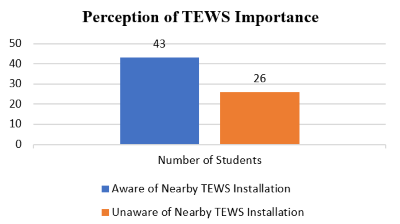Perception of Elementary School Students on the Tsunami Early Warning System (TEWS) in High-Risk Tsunami Zones in Padang City
DOI:
https://doi.org/10.24036/cived.v12i1.661Keywords:
Tsunami Early Warning System, Disaster Mitigation, Student Perception, Disaster Preparedness, Community PreparednessAbstract
This study aims to understand students' perceptions of the Tsunami Early Warning System (TEWS) in tsunami-prone areas, focusing on SD Pertiwi 2 in Padang City. TEWS is crucial in disaster risk mitigation as it provides early warnings to reduce casualties during a tsunami. This research utilizes a quantitative descriptive approach, with a questionnaire distributed to 69 sixth-grade students. The findings reveal that 85.51% of students understand TEWS, 97% believe TEWS is essential for safety, yet only 63% are aware of a TEWS installation near their school. These results indicate a need for enhanced local education about TEWS, particularly by schools and relevant agencies.
Downloads
References
S. F. Rahmadhani Z, Teuku Yan W.N, and Cipta Endayana, “Prediksi Landaan Bencana Tsunami Ketinggian 5 dan 12 Meter di Kota Padang, Sumatera Barat,” Jurnal Geologi dan Sumberdaya Mineral, vol. 24, no. 3, pp. 125–134, Aug. 2023, doi: 10.33332/jgsm.geologi.v24i3.747.
Badan Meteorologi Klimatologi & Geofisika, Pedoman Pelayanan Peringatan Dini Tsunami. Jakarta Pusat: Badan Meteorologi Klimatologi & Geofisika, 2012.
N. Dias, R. Haigh, D. Amaratunga, and H. Rahayu, “A review of tsunami early warning at the local level - Key actors, dissemination pathways, and remaining challenges,” International Journal of Disaster Risk Reduction, vol. 101, p. 104195, Feb. 2024, doi: 10.1016/j.ijdrr.2023.104195.
D. H. Natawidjaja et al., “Source parameters of the great Sumatran megathrust earthquakes of 1797 and 1833 inferred from coral microatolls,” J Geophys Res Solid Earth, vol. 111, no. 6, Jun. 2006, doi: 10.1029/2005JB004025.
S. Ayub, W. Wahyudi, M. Taufik, S. Sutrio, and N. N. S. P. Verawati, “Pelatihan Pemantapan Langkah-Langkah Penyelamatan Diri dari Bencana Gempabumi di SDIT Anak Sholeh Mataram,” Jurnal Pengabdian Masyarakat Sains Indonesia, vol. 2, no. 1, Dec. 2019, doi: 10.29303/jpmsi.v2i1.18.
H. P. Rahayu, L. K. Comfort, R. Haigh, D. Amaratunga, and D. Khoirunnisa, “A study of people-centered early warning system in the face of near-field tsunami risk for Indonesian coastal cities,” Int J Disaster Resil Built Environ, vol. 11, no. 2, pp. 241–262, Mar. 2020, doi: 10.1108/IJDRBE-10-2019-0068.
H. Septa, A. H. Algamar, Y. Yuliza, and R. Yunanda, “Experience in handling the 2009 earthquake in Padang City and the role of The Regional Disaster Management Agency in disaster management,” E3S Web of Conferences, vol. 464, p. 07004, Dec. 2023, doi: 10.1051/E3SCONF/202346407004.
S. Arikunto, Prosedur penelitian suatu pendekatan praktek, Edisi revisi 4. Rineka Cipta, 1998. Accessed: Oct. 14, 2024. [Online]. Available: https://cir.nii.ac.jp/crid/1130000795354347648.bib?lang=en
Sugiyono, Metode Penelitian Kuantitatif, Kualitatif, dan R&D, 2nd ed. Bandung: Alfabeta, 2022.
M. Tavakol and R. Dennick, “Making sense of Cronbach’s alpha,” Int J Med Educ, vol. 2, pp. 53–55, Jun. 2011, doi: 10.5116/ijme.4dfb.8dfd.
Khairurrijal, Udrekh, M. Ryadi, H. S. Naryanto, M. H. Pradono, and M. M. Munir, Pedoman Perencanaan Pemasangan Sirine dan Sistem Peringatan Dini Berbasis Masyarakat. Jakarta: Badan Nasional Penanggulangan Bencana, 2014.
E. Wahyuni, “Tingkat Pengetahuan Siswa Tentang Kesiapsiagaan Bencana Di SMAN 1 Pariaman Sumatera Barat dan SMAN 2 Depok Jawa Barat Tahun 2011,” Universitas Indonesia, Jakarta, 2011.
K. Ogata, S. Seto, R. Fuji, T. Takahashi, and H. Hinata, “Real-Time Tsunami Detection With Oceanographic Radar Based on Virtual Tsunami Observation Experiments,” Remote Sens (Basel), 2018, doi: 10.3390/rs10071126.
M. N. Shrivastava et al., “Tsunami Detection by GPS-derived Ionospheric Total Electron Content,” Sci Rep, 2021, doi: 10.1038/s41598-021-92479-3.

Downloads
Published
How to Cite
Issue
Section
License
Copyright (c) 2025 Affifa Syah Raudhatul Jannah, Eka Juliafad

This work is licensed under a Creative Commons Attribution 4.0 International License.







2.jpg)
